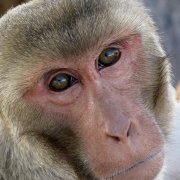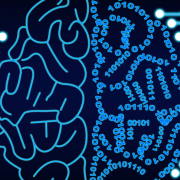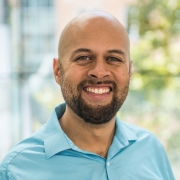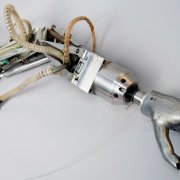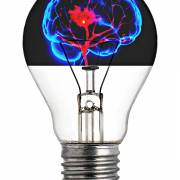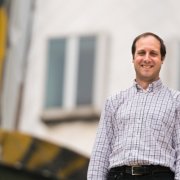July 23, 2018 - 10:45 am
"Most animals, including our primate cousins, communicate: they gesture, grimace, grunt, and sing. As a rule, however, they do not speak. So how, exactly, did humans acquire their unique talent for verbal discourse? And how do our brains manage this complex bit of communicative magic?
Scientists in the lab of Winrich Freiwald have shed new light on the underpinnings of human speech by identifying neural circuitry in the brains of monkeys that...
July 16, 2018 - 12:00 pm
Following an enthusiastic endorsement by the Committee on Scientific Affairs, three Rockefeller scientists have been promoted to professor, effective July 1. Receiving promotions are Sean Brady, head of the Laboratory of Genetically Encoded Small Molecules; Winrich Freiwald, head of the Laboratory of Neural Systems; and Luciano Marraffini, head of the Laboratory of Bacteriology.
Winrich Freiwald
Freiwald studies how the brain analyzes the visual...
July 13, 2018 - 4:00 pm
Dr. Leyla Isik, Kanwisher Lab (MIT) and Kreiman Lab (Children's Hospital Boston, Harvard Medical)
Abstract:
Social interaction perception is a crucial part of the human visual experience that develops early in infancy and is shared with other primates. However, it remains largely unknown how humans compute information about others’ social interactions from visual input. In the first part of my...
Social interaction perception is a crucial part of the human visual experience that develops early in infancy and is shared with other primates. However, it remains largely unknown how humans compute information about others’ social interactions from visual input. In the first part of my...
July 13, 2018 - 9:45 am
BY DR. LOUIS ALPERT
Ombudsman
"…..BREAKING NEWS FROM MIT…..
Your humble author of the Ombudsman Alert, who taught Mathematics at MIT during 1957-60, was honored to also be a junior member of a research team in the emerging science of Artificial Intelligence established in those years by MIT Professors John McCarthy and Marvin Minsky, currently known as the “Fathers of Artificial Intelligence” as well as Professor Claude Shannon, widely...
July 12, 2018 - 11:45 am
"MIT recently announced the “MIT Quest for Intelligence.” President Rafael Reif said the campuswide initiative will pursue two key questions: “How does human intelligence work, in engineering terms? And how can we use that deep grasp of human intelligence to build wiser and more useful machines, to the benefit of society?”
As associate director of the Center for Brains Minds and Machines (CBMM), Matt Wilson, Sherman Fairchild Professor in...
July 2, 2018 - 4:00 pm
Prof. Lior Wolf, Tel Aviv University and Facebook AI Research
Abstract: Generative models are constantly improving, thanks to recent contributions in adversarial training, unsupervised learning, and autoregressive models. In this talk, I will describe new generative models in computer vision, voice synthesis, and music.
In music – I will...
In music – I will...
June 25, 2018 - 11:15 am
(Carlos R. Ponce is an Assistant Professor in the Department of Neuroscience at Washington University School of Medicine. The opinions expressed are his own.)
By Carlos R. Ponce
"While preparing for a recent move to St. Louis, Missouri, the first item I packed was my dearest possession, an old faded picture of a cow grazing in a sloping field in Mexico. This was the only cow my grandparents owned and they sold it to pay a smuggler to bring me...
June 18, 2018 - 2:45 pm
How does human intelligence work, in engineering terms? And how can we use that deep grasp of human intelligence to build wiser and more useful machines?
This year MIT launched the MIT Intelligence Quest, an initiative to discover the foundations of human intelligence and drive the development of technological tools that can positively influence virtually every aspect of society. And to help ensure that the effects of these advances will, in...
June 17, 2018 - 3:45 pm
By Akshaiyaa V S
And God said, “Let there be light”.
Figuratively, this bible verse points towards light as the foundation of life; the driving force behind our psyche. Bright light is always associated with joy and victory. But sometimes, the best ideas come only in subtle darkness. In this case, it was in the form of algae.
A Unicellular alga known as Chlamydomonas, produces proteins called opsins which can convert light into an electrical...
June 14, 2018 - 3:30 pm
DeepMind’s advance could lead to machines that can make better sense of a scene.
by Will Knight
Machines will need to get a lot better at making sense of the world on their own if they are ever going to become truly intelligent.
DeepMind, the AI-focused subsidiary of Alphabet, has taken a step in that direction by making a computer program that builds a mental picture of the world all by itself. You might say that it learns to imagine the world...
June 11, 2018 - 3:00 pm
On June 11, 2018, Provost Martin A. Schmidt announced that Prof. Antonio Torralba has been named the inaugural director of the MIT Quest for Intelligence, effective immediately.
“The range of questions we aspire to explore through the Quest is simply breathtaking,” says MIT President L. Rafael Reif. “There are moments in the history of science when the tools, the data, and the big questions are perfectly synchronized to achieve major advances. I...
June 10, 2018 - 3:15 pm
by Kyle Wiggers @Kyle_L_Wiggers
To describe Max Tegmark’s career as “storied” is to do the Swedish-American physicist a disservice. He’s a professor at the Massachusetts Institute of Technology, scientific director of the Foundational Questions Institute, and cofounder of the Future of Life Institute (FLI). He’s published more than 200 publications and developed data analysis tools for microwave background experiments. And he’s been elected as a...
June 8, 2018 - 4:00 pm
Dr. Nima Deghani (MIT Physics)
Abstract: Thalamus has traditionally been considered as only a relay source of cortical inputs, with hierarchically organized cortical circuits serially transforming thalamic signals to cognitively-relevant representations. Given the absence of local excitatory connections within the thalamus, the...
June 2, 2018 - 1:00 pm
By Andy Rosen Globe Staff June 02, 2018
Patrick Winston’s computer is learning about revenge, ambition, and murder. It knows that victory can make you happy. But it also knows you can’t be happy if you’re dead.
The computer had to learn these things in order to read “Macbeth” — or, rather, an extremely truncated version of Shakespeare’s blood-soaked Scottish tragedy. At just 37 sentences, the rough summary reduces the Bard’s immortal poetics to...
June 1, 2018 - 4:00 pm
Dr. SueYeon Chung (MIT, BCS Fellow in Computation)
Object manifolds arise when a neural population responds to an ensemble of sensory signals associated with different physical features (e.g., orientation, pose, scale, location, and intensity) of the same perceptual object. Object recognition and discrimination require classifying the manifolds in...

